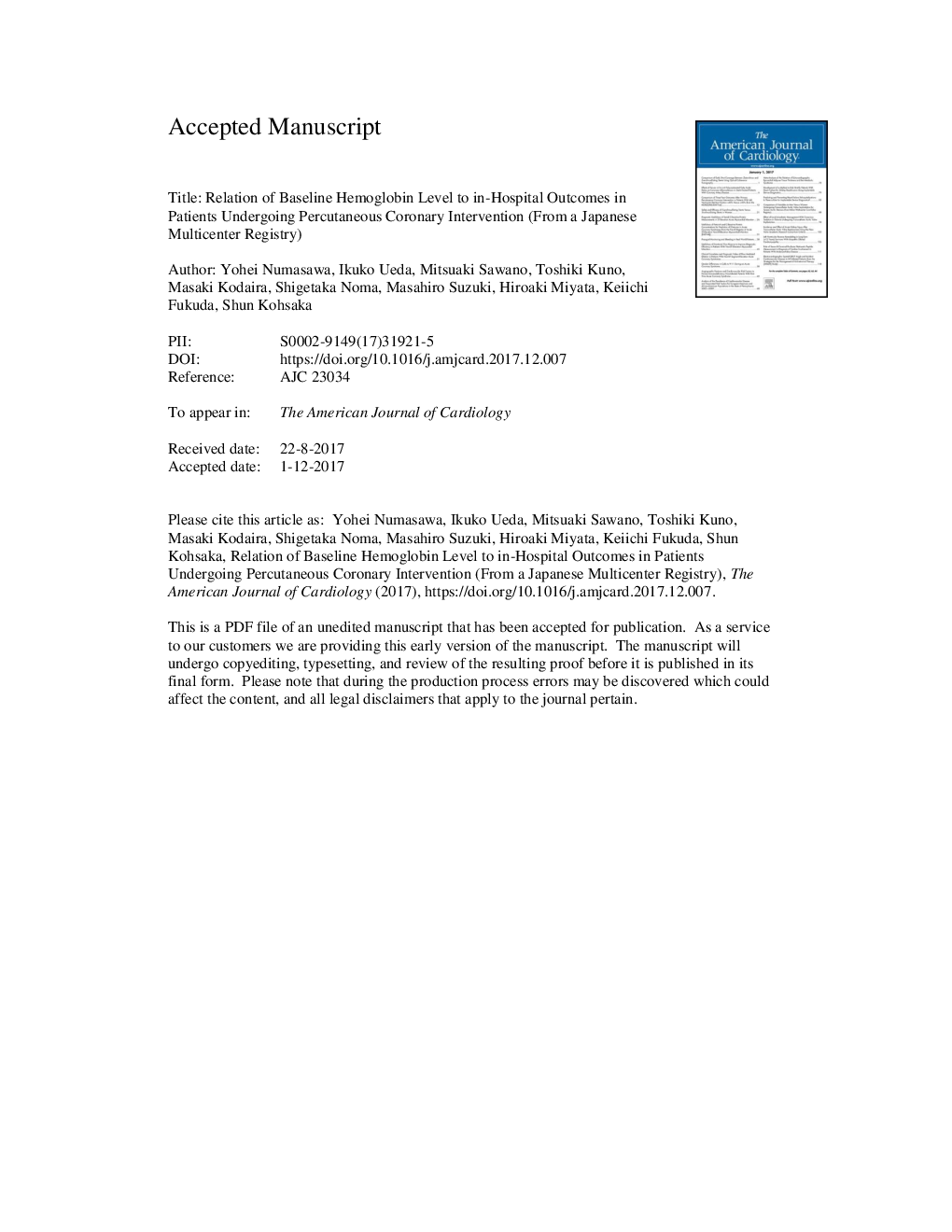| کد مقاله | کد نشریه | سال انتشار | مقاله انگلیسی | نسخه تمام متن |
|---|---|---|---|---|
| 8651466 | 1572065 | 2018 | 32 صفحه PDF | دانلود رایگان |
عنوان انگلیسی مقاله ISI
Relation of Baseline Hemoglobin Level to In-Hospital Outcomes in Patients Who Undergo Percutaneous Coronary Intervention (from a Japanese Multicenter Registry)
ترجمه فارسی عنوان
ارتباط سطح هموگلوبین مبتنی بر نتایج در بیمارستان در بیماران مبتلا به مداخله عروق کرونر (از یک مجله چند کانونی ژاپنی)
دانلود مقاله + سفارش ترجمه
دانلود مقاله ISI انگلیسی
رایگان برای ایرانیان
موضوعات مرتبط
علوم پزشکی و سلامت
پزشکی و دندانپزشکی
کاردیولوژی و پزشکی قلب و عروق
چکیده انگلیسی
Scarce data exist regarding the relation between baseline hemoglobin and in-hospital outcomes after percutaneous coronary intervention (PCI). We studied 13,010 cases of PCI in a Japanese multicenter registry from 2008 to 2016. Patients were divided into 5 groups according to 2-g/dl increments in their preprocedural hemoglobin (from <10 to >16âg/dl). Patients with lower hemoglobin levels were older and had higher proportions of females and co-morbidities, including diabetes mellitus and renal failure, than those with higher hemoglobin levels. In-hospital complications were observed more frequently in patients with lower than higher levels. After adjustment, baseline hemoglobin was inversely associated with total procedural complications (odds ratio [OR] 0.87, 95% confidence interval [CI] 0.84 to 0.90, pâ<0.001), in-hospital mortality (OR 0.82, 95% CI 0.77 to 0.87, pâ<0.001), and bleeding complications (OR 0.93, 95% CI 0.88 to 0.98, pâ=â0.007). Categorically, reverse J-shaped curvilinear correlations were present between baseline hemoglobin and in-hospital adverse outcomes. When the reference group comprised patients with a baseline hemoglobin of 12 to 14âg/dl, patients within the lowest hemoglobin levels (<10âg/dl) were at the highest risk of total procedural complications (OR 2.57, 95% CI 2.07 to 3.17, pâ<0.001), in-hospital mortality (OR 3.46, 95% CI 2.34 to 5.11, pâ<0.001), and bleeding complications (OR 2.36, 95% CI 1.70 to 3.25, pâ<0.001). In subgroup analyses, similar trends were observed in both men and women, and in both patients with acute coronary syndrome and stable coronary artery disease. In conclusion, a low baseline hemoglobin is a simple and powerful predictor of poor outcomes in patients who undergo PCI.
ناشر
Database: Elsevier - ScienceDirect (ساینس دایرکت)
Journal: The American Journal of Cardiology - Volume 121, Issue 6, 15 March 2018, Pages 695-702
Journal: The American Journal of Cardiology - Volume 121, Issue 6, 15 March 2018, Pages 695-702
نویسندگان
Yohei MD, Ikuko PhD, Mitsuaki MD, Toshiki MD, Masaki MD, Shigetaka MD, Masahiro MD, Hiroaki PhD, Keiichi MD, Shun MD,
